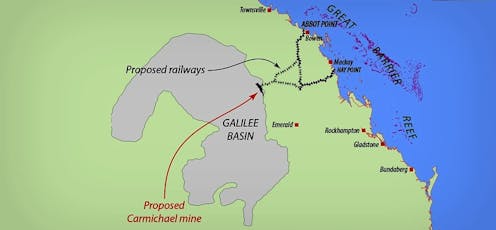If the Adani mine gets built, it will be thanks to politicians, on two continents
- Written by Quentin Beresford, Professor of Politics, Edith Cowan University

With the final approval of the Adani Carmichael coal mine now apparently imminent[1], it is important to ask how it has seemingly defied the assessment of experts that it is not financially viable.
After all, it’s only a week since the Chinese owner of another mine planned for the Galilee Basin, the China Stone mine, suspended its bid for mining leases[2] because of commercial considerations.
The numbers appear not to add up[3] because the location is remote, the coal would be expensive to transport, and the price is expected to fall[4].
But such a purely financial analysis ignores the political forces driving the development of the coal industry in both India and Australia.
Mates in in India, mates in Australia
In short, both are locked into what I describe as a model of crony capitalism[5], in which special deals are handed out to projects such as Adani that tip the scales in favour of development.
The actions of China and Japan in deploying enormous state power to export their respective coal technologies to Southeast Asia strengthens the hands of those pushing such developments.
In my recent book, Adani and the war over coal[6], I outline a network of power that for several decades has promoted the development of Australia’s coal resources in the interests of national and international corporations.
The mining companies, then the big four banks became part of it, lending billions in the rush to develop Australian coal mines as Asian countries sought to lock in long-term supplies. The Minerals Council of Australia, the New South Wales Minerals Council and the Queensland Resources Council, with their collective close ties to both political parties, handled public relations.
Read more: With the LNP returned to power, is there anything left in Adani's way?[7]
Yet they have faced resistance from the rise of an anti-Adani movement that links grassroots environmentalists, peak environmental lobby groups and progressive organisations such as GetUp!
By mid-2018, these campaigners seemed to have backed the Carmichael mine into a cul de sac by scaring off both Australian and foreign investors. They had also pressured the Queensland government to withdraw its support for a loan to the project from the Commonwealth government’s Northern Australia Infrastructure Facility[8].
Then Adani surprised them by announcing that it would scale back the project and fund it from its own resources[9]. On the face of it this seemed unlikely, but it had help.
Adani and Modi have history
The chairman and founder of the Adani group, Gautam Adani, has had a long relationship with the recently re-elected Prime Minister of India, Narendra Modi[10].
Modi played a decisive role in paving the way for Adani’s latest mega deal: selling coal-fired power from a plant in the Indian state of Jharkhand to nearby Bangladesh[11].
The power for Bangladesh is set to be fired by Carmichael coal. Many Australians would be concerned to learn that our coal is to be used to power one of the most climate-challenged[12] countries on the planet, but we have this on the authority of Adani’s previous Australian-based chief executive, Jeyakuma Janakaraj[13].
Twelve days before the 2019 Indian election date was announced, the Modi government gave approval for an Adani project in Jharkhand to become the first designated power project in India to get the status and benefits of a Special Economic Zone, saving Adani billions of dollars in taxes[14], including clean energy taxes.
The Indian state will provide land, infrastructure and water for the project and shoulder the burden of pollution. The cost of the power to Bangladesh is not expected to be cheap[15].
Will we be asked for more?
Adani’s form suggests it might come back to Australia for more. Following the re-election of the Morrison government it is already being speculated that the pro-coal Minister for Resources, Matt Canavan, will revisit the original proposal for a billion-dollar government-sponsored loan[16] from the Northern Australia Infrastructure Facility to construct the railway from the Galilee Basin to the Abbot Point coal port.
The Adani saga points to a critical flaw in the Paris climate agreement[17]. It is an agreement between nation states, but what those states do is often determined by arrangements between politicians and private companies that feel no particular obligation to keep global warming to less than two degrees.
We are pawns in a larger, climate-destroying game.
Read more: Interactive: Everything you need to know about Adani – from cost, environmental impact and jobs to its possible future[18]
References
- ^ apparently imminent (www.abc.net.au)
- ^ suspended its bid for mining leases (www.caixinglobal.com)
- ^ appear not to add up (www.smh.com.au)
- ^ expected to fall (www.industry.gov.au)
- ^ crony capitalism (www.newsouthbooks.com.au)
- ^ Adani and the war over coal (www.newsouthbooks.com.au)
- ^ With the LNP returned to power, is there anything left in Adani's way? (theconversation.com)
- ^ Northern Australia Infrastructure Facility (agriculture.gov.au)
- ^ fund it from its own resources (www.afr.com)
- ^ Narendra Modi (www.afr.com)
- ^ to nearby Bangladesh (economictimes.indiatimes.com)
- ^ climate-challenged (www.dw.com)
- ^ Jeyakuma Janakaraj (www.themorningbulletin.com.au)
- ^ saving Adani billions of dollars in taxes (scroll.in)
- ^ not expected to be cheap (scroll.in)
- ^ billion-dollar government-sponsored loan (www.mattcanavan.com.au)
- ^ Paris climate agreement (unfccc.int)
- ^ Interactive: Everything you need to know about Adani – from cost, environmental impact and jobs to its possible future (theconversation.com)
Authors: Quentin Beresford, Professor of Politics, Edith Cowan University




